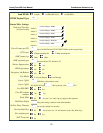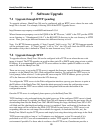
HandyTone-386 User Manual Grandstream Networks, Inc.
28
7 Software Upgrade
7.1 Upgrade through HTTP (pending)
To upgrade software, HandyTone-386 can be configured with an HTTP server where the new code
image file is located. For example, following URL in the HTTP Upgrade Server:
http://firmware.mycompany.com:6688/Grandstream/1.0.0.4
Where firmware.mycompany.com is the FQDN of the HTTP server, “:6688” is the TCP port the HTTP
server listening to, “/Grandstream/1.0.0.4” is the RELATIVE directory to the root directory in HTTP
server. Thus, you can put different firmware into different directory as well.
Note: For HTTP firmware upgrade, if “Auto Upgrade” field is set to “No”, HTTP firmware upgrade
will be performed once. If “Auto Upgrade” is set to “Yes”, the ATA will check the HTTP server in
the number of days that is defined in “Check for new firmware every” field.
7.2 Upgrade through TFTP
To upgrade software, HandyTone-386 can be configured with a TFTP server where the new code
image is located. The TFTP upgrade can work in either static IP or DHCP mode using private or public
IP address. It is recommended to set the TFTP server address in either a public IP address or on the
same LAN with the HandyTone-386.
There are two ways to set up the TFTP server to upgrade the firmware, namely through voice menu
prompt or via the HandyTone-386’s Web configuration interface. To configure the TFTP server via
voice prompt, follow section 5.1 with option 06, once set up the TFTP IP address, power cycle the
ATA, the firmware will be fetched once the ATA boots up.
To configure the TFTP server via the Web configuration interface, open up your browser to point at
the IP address of the HandyTone-386. Input the admin password to enter the configuration screen.
From there, enter the TFTP server address in the designated field towards the bottom of the
configuration screen.
Once the TFTP server is configured, please power cycle the HandyTone-386.
TFTP checking is only performed during the initial power up. If the configured TFTP server is found
and a new code image is available, the HandyTone-386 will attempt to retrieve the new image files by
downloading them into the HandyTone-386’s SRAM. During this stage, the HandyTone-386’s LED
will blink until the checking/downloading process is completed. Upon verification of checksum, the
new code image will be saved into the Flash. If TFTP fails for any reason (e.g., TFTP server is not
responding, there are no code image files available for upgrade, or checksum test fails, etc), the
HandyTone-386will stop the TFTP process and simply boot using the existing code image in the flash.
TFTP process may take as long as 1 to 20 minutes over the Internet, or just 20+ seconds if it is
performed on a LAN. Users are recommended to conduct TFTP upgrade in a controlled LAN
environment if possible. For those who do not have a local TFTP server, Grandstream provides a


















